social bookmarking tools:
 |
|
| Available RSS Feeds |
|---|
 - Top Picks - Top Picks |
 - Today's Music - Today's Music |
 - Editor's Blog - Editor's Blog
|
 - Articles - Articles
|
Add Louisville Music News' RSS Feed to Your Yahoo!
|
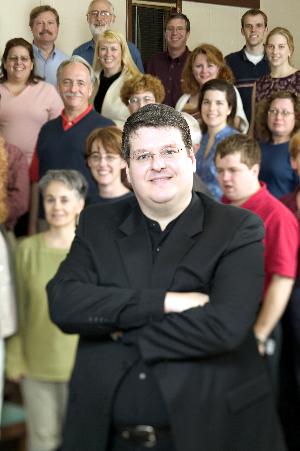
Magic For Somebody:
Behind The Voices Of The Louisville Chorus
." . .from then on it is as though the angels themselves were singing their Gloria in Excelsis and showering upon the earth from the near stars, the stars that seem to have become close and warm, their messages and promises of peace, peace!"
-Thomas Merton, from the original unpublished manuscript of The Seven Storey Mountain
Prologue
A Saturday Afternoon Between Thanksgiving and Christmas, Downtown Louisville, 1967 - My mom and I step from the Fourth Street-side door of the Commonwealth Building. A short cold blast of wind smacks us with the familiar smells of downtown: diesel exhaust, the yeasty scent of bread and rolls from the bakery close to where we stand, the hint of fried food that slips from the revolving door of the Blue Boar Cafeteria. The sky is the color of a battleship hull and the air feels damp, threatening snow. Traffic up and down Fourth Street moves at a slow crawl. The sidewalks are thick with people, some clutching clusters of large shopping bags covered with the names of stores now long gone: Selman's, Kaufmann's, Behr's, Readmore, Vine Records, their buildings now bulldozed, built over, boarded-up, or converted into wig shops and nail salons.
Back at home my father and brother have already strung lights around the front of the house - the kind with bulbs as big as a thumb and in colors that glowed as warm as campfire embers - and the first wave of Christmas decorations have been dragged from the attic, still in their boxes and ready to invade the house for a month-long occupation. In the basement, a small stack of Christmas albums rests on a shelf under an old tube amplifier and turntable. The day after Thanksgiving they were pulled from the lower shelf where all the other albums were kept, still grouped together in the same order they were placed the year before. It's a small pile of stuff that's been in the family for years, but it contains the one that was a signal of the holidays in our household: Now is the Caroling Season by Fred Waring and the Pennsylvanians, sacred and modern choral music with a sound that could fill in every hidden corner of the soul with warmth.
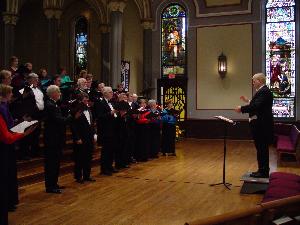
My mom pulls me through the mass of holiday shoppers as we walk north toward our destination, past a Salvation Army bell-ringer dressed as Santa. We cross Chestnut Street to the east side of Fourth. Up one block at the Stewart's Dry Goods building, people, some with children, are standing in front of large picture windows that cast pale orange glows onto them. Normally, styled-up mannequins are behind the glass, but every Christmas season the windows would encase mechanized puppets: elves making toys, one of them repeatedly banging a hammer against a train wheel; an unhatted Santa - moving up and down in his rocking chair - pipe in one hand, in the other the top of a list that curled down around his feet; Mrs. Claus overseeing a different batch of elves in front of a tablespread of gingerbread men and cookies; a girl elf in blonde curls and bright red lipstick holding a tray of treats, pivots at her waist from one side to the other, her gaze shifting from the window to the stove as if she's contemplating a choice. It is the late 1960s, after all.
Inside the store, with large aluminum snowflakes hanging from cathedral-high ceilings and bushy wreaths on tall Romanesque supporting s, shoppers weave around each other. I lead my mom toward the escalator, the pathway to Toyland, an area of a rear stockroom on the second floor cleared out to make room for shelves and shelves of toys. From the public address speaker high above the floor comes the Fred Waring version of "O Come, O Come, Immanuel," the same way it sounds at home - single-channel and tinny, but familiar.
And at once the bliss of the holiday season locks in: the weather, the crowd, the anticipation of being surrounded by shelves of toys and, overhead, the singing.
A balmy Tuesday night early this past November, 36 years later, proved that it isn't easy to invoke that kind of vocal holiday magic. It does take some work. . . .
A large man in glasses and graying dark hair waves a pencil back and forth and shakes his head. "No," he says calmly but with volume to nearly thirty people seated on risers in front of him: the members of The Louisville Chorus. "I want him to sound like heeem. Thou shalt know heeem. Put that accent on your vowels. I need you to be English for me, okay?."
There are a few chuckles from the chorus members. The accompanying pianist plays the single key note and music starts again. The man raises his arms them drops them for the down beat. Five bars into the piece he begins to sing his instructions to the sopranos along with the melody line. Another wave of the pencil and the music stops.
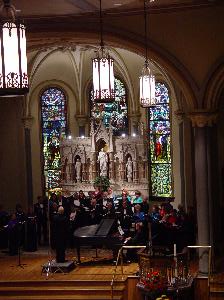
The music is Mark Sirett's "Thou Shalt Know Him," a tender anthem based on an anonymous text. It is one of the pieces being heavily rehearsed by The Louisville Chorus for its Triple Holiday Concert series, a set of individual performances during three weekends in December, where the musical styles range from one show to the next, from deeply reverent to whimsical, from sacred to sentimental: a mirror, if you will, of the feelings generally associated with the holiday season (except, of course, the snittiness that comes from sitting too long in mall traffic).
The place is the wide choir room of Westport Road Baptist Church, an acoustically solid rehearsal space flooded with florescent lighting and stuffy because of the unseasonably warm air outside.
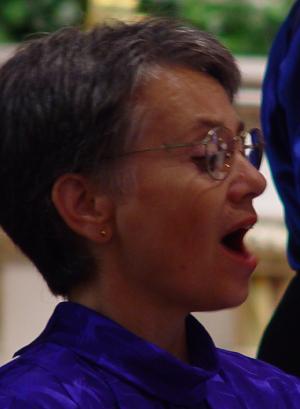
The people, of widely-varying ages - college students, office workers, teachers, retirees - are the members of The Louisville Chorus.
The slim woman behind the piano is Therese Davis, the organization's Executive Director. The man waving the pencil, speaking with a crisp voice haunted by a light drawl when he asks his choir to sing in British accents, who reiterates each time they stop the necessity of hearing vowels ring in your head when you sing, is Samuel Timothy Glasscock, IV, or just `Tim' to those who know him, the group's Artistic Director.
And 2003 marks the group's 65th season of performances.
Created in 1939 by Father Joseph Emrich as The Holy Name Band and Choral Club, The Louisville Chorus is the oldest thriving choral arts agency in Kentucky. With one performance already behind them for the 2003-04 season, the chorus is now deep into rehearsals for the balance of their performances: the three for the holiday season, the Unforgettable Valentine Dinner Concert, a performance of Maurice Durufle's "Requiem, Opus 9" in March and the Saturday Night Cabaret in May. Plus as a fitting cap to their 65th season, the chorus has released a new two-disk set of seasonal masterworks and holiday standards, The Art of Christmas.
Pretty good for a group that has gone through an artistic transition under a new director. And as with any new leadership, some things stay the same, but others might change slightly.
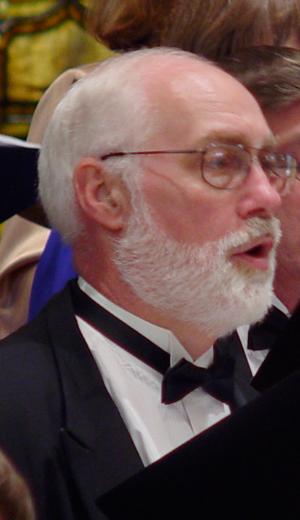
"One thing I am very committed to," Glasscock said, "as well as [predecessor Daniel Spurlock] was, is good music, quality music, good concerts covering the community, making sure there's something for everyone to be gained from going to a Louisville Chorus concert. At the same time, I am possibly even more vocally-oriented. I am a great believer in a bel canto style of singing, the beauty of the voice as its own instrument. So maybe that approach is not so different, but at the same time I don't come at this from the perspective of someone who has been a part of a professional instrumental ensemble. I have been specifically vocal for my entire life."
Born in Perryville, Kentucky, Glasscock led his first choir at age 13 at a Disciples of Christ church ("It was an unusual situation," Glasscock said. "We actually did selections from The Messiah at a Christmas concert. That was an experience," he added quietly with a smile). He has since conducted ensembles within the Indiana University system, at private colleges such as Campbellsville University and is currently the head of the vocal studies department at the Jefferson County Youth Performing Arts School. He has also finished his course work for the Doctorate of Musical Arts in Choral Conducting at the University of Kentucky.
To drag out a moldy cliché from the late 1980s: Tim knows choral.
"We approach every piece of music as though it were a solo piece of music," he said, "so that every voice understands that it has to make a beautiful sound. There are no voices that are allowed to be hidden in the texture. If you are going to sing, you need to make a beautiful sound."
"He also serves as a composer's advocate," said Therese Davis, the ensemble's executive director. "So the character and style are of utmost importance as well."
The three of us sat at a table at the Third Avenue Café, which occupies the space that once contained a neighborhood pharmacy at the corner of Oak and Third Streets in Old Louisville. Close by us, a mannequin dressed as Elvis - white jumpsuit, red stole and a bejeweled plastic gold crown - stared through thick gold-framed sunglasses at post-rush-hour traffic.
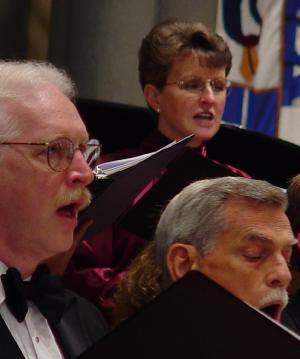
Glasscock continued. "We are always wondering if what we're doing serves the composer's intention to begin with. I don't take a piece of music and change what's going on in it to suit what I want unless there is a very good reason for it."
Yet that does not mean Glasscock is satisfied with mere just-sing-the-little-black-dots-on-the-page renditions of choral music in order to remain safe within a composer's intention, known or hinted or even guessed. Sometimes Glasscock throws in a small change during a performance - in a gesture, in the nuance of a facial expression - that can at once alter tempo or change an inflection, perhaps bring out a rich alto passage that wasn't realized while the ensemble practiced. It leads to a quid pro quo dynamic between himself and the ensemble and, ultimately, the audience. A choral yin-yang, if you will.
"Music is the moment," Glasscock said. "Music is living in the moment and producing an artistic product on the spot. If, indeed, you do perform it exactly the way you rehearse it and there is no spontaneity at the performance, it's almost like we could have recorded it and shown up and listened to the tape.
"I know that a lot of people feel that you rehearse a piece of music exactly the way you plan on performing it. I have a philosophy that I never want to rehearse it exactly the same and never want to perform it exactly the same because of the attention that you get from the singers when they know that, at any moment, you can change your mind. And that keeps our eyes on each other, keeps our focus, keeps us sharp."
"The way I like to see it," Davis said, "it starts with him and goes to the singers, but it bounces back to him. The singers are playing off of him, he's also playing off the singers, but the audience doesn't know that. They get the end result."
"Our philosophy at The Louisville Chorus," Glasscock added, "is not only do we want to challenge ourselves, but we want to please the audience and please the singers so that we're all having a good time."
It is an important attitude to have with a holiday season stoked full on emotions and sentiment. Where one chord can fan open a memory in a listener's mind, back to when the most important days of the year were cold and packed with excitement that increased daily. Where school never seemed to end soon enough and dinner was served when the sky was black. Days that came to an abrupt halt when you'd see an evergreen tree stripped of decorations lying sideways next to the garbage can. There would be an empty space in the room where it once stood. The vacuum cleaner close by.
Vocal music- choral music, specifically - is best equated with the warmth and power of the season. The Louisville Chorus plans to provide both in its set of three Christmas performances, the first of which will be "Christmas at St. Mary's" in Jeffersonville on December 7. The next will be at the Cathedral of the Assumption on December 13.
"At the Cathedral," Glasscock said, "is where we pull out as close to masterworks as Christmas carols and pieces get. It's a little bit more formal, but it is more alternative type arrangements."
While that doesn't mean the audience will hear a Pearl Jam version of "Do You Hear What I Hear," it does mean that they will probably be exposed to seasonal music they have never heard. One example, an Austrian carol called "O Come, Little Children," a piece most often sung by children in Austria and Germany, but the arrangement the ensemble will perform at the cathedral is something Glasscock finds hard to describe.
"[The Cathedral's] such a striking place to sing something that's very different. The piece is not just involved, it's not just intricate. . .it's positively sculpted. It's unbelievable how layered it is. It's more than three-dimensional. It's sort of a quantum Christmas carol."
But The Louisville Chorus is not relegating its holiday selections to masterworks or obscure carols that may have been arranged by Stephen Hawking. The final concert for the holidays will be "Mistletoe & Sugarplums," a benefit for the Make-A-Wish Foundation at Memorial Auditorium on December 13 featuring the fun and popular songs of Christmas.
The ability and willingness to cover the entire range of the season's music is not just because the ensemble intends to please its audience. It is simply because they can.
"We do an awful lot of music because of the depth of the chorus's resources," Glasscock said, "because of how long the chorus library has been around. You're talking about 65 years of collecting music. We have stuff that no one else has and we have things that have gone out of print and you can't get anymore. At the same time we have the resources of the Youth Performing Arts School, which has been collecting music since 1978. So we've got a huge amount of music to choose from. And its neat to dig out things that you know no one who's there has ever heard before."
The chorus also borrows selections from the Southern Baptist Theological Seminary, the University of Louisville, or other choral groups around the country. And The Louisville Chorus responds in kind.
"I would like to say the truth is we buy less music than we would like to," Davis said. "We're an arts agency. We don't get all of our pleasures. And we have appealed to the Kentucky Colonels for some funding for just that purpose."
Glasscock agreed. "Choral music is terribly expensive. There is so much new stuff out there every year. We would surely like to have the luxury of really adding to the library."
Just as a conductor's score contains all parts of a song, The Louisville Chorus also has many parts that create its total package of magic: widespread resources for choral music of all kinds, a talented ensemble that is as diverse in age ranges as a family reunion (one of them, music librarian Dot Curley, has been with the group for more than 60 years), an administrator who not only keeps the group organized and funded but also doubles as its pianist and an artistic director whose knowledge of music spans centuries and who has led choral ensembles since early adolescence.
Davis said, "It fits with the repertoire of The Louisville Chorus. [We have] the widest variety of any arts agency anywhere around here, from choral masterworks to Bluegrass and everything in between."
"You never know what's going to touch an individual sitting in the audience," Glasscock said. "We try to do everything. Cover everything. There you have magic for somebody. To us, it's just another piece of music. We might have enjoyed it, but to someone else it may be the highlight of the year."
The Art of Christmas, the two-disk CD set from The Louisville Chorus, is available at Borders and all Winn-Dixie stores in the region. You can find more information about the CD, upcoming performances, ticket prices, auditions, or how you can support the organization at www.fastzone.com/chorus, or call 968-6300.
